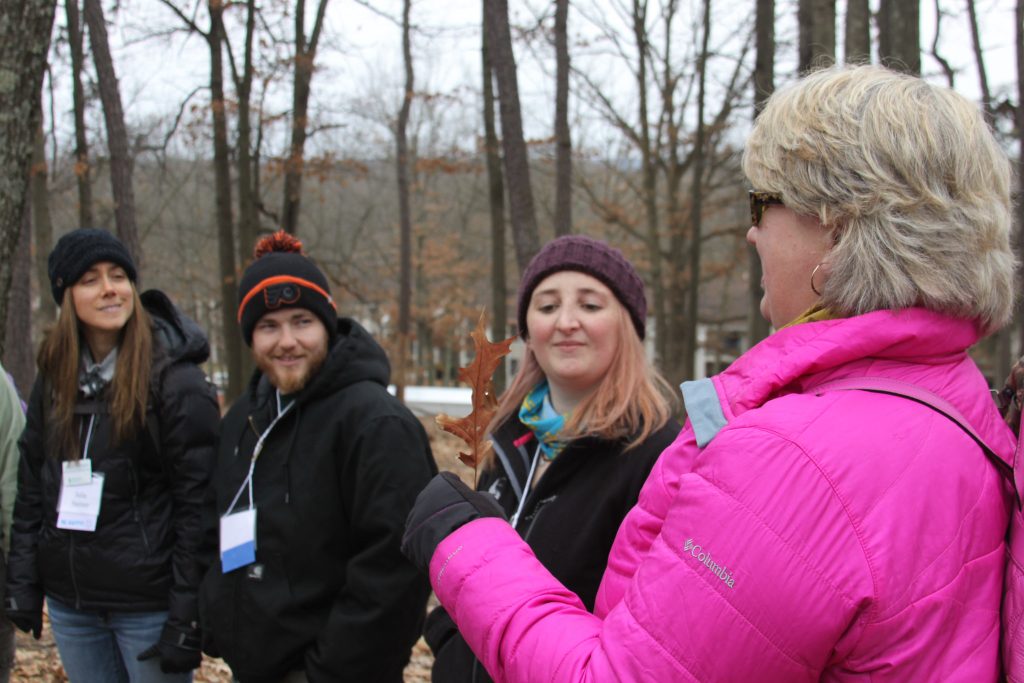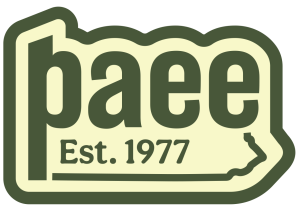Congratulations!
Welcome to PAEE's Environmental Education Certification Program!

We are so excited to have you enrolled in our environmental education certification program! Your commitment to learning and making a difference in our world is commendable. Remember, we’re here to support you every step of the way on this exciting journey toward becoming a certified environmental educator. If you have any questions or need assistance, don’t hesitate to reach out to us. Together, we can make a positive impact on our environment and inspire others to do the same!
Contact information:
- Stacey Widenhofer (PAEE Administrative Coordinator) – stacey@paee.net
- Alyssa Doster (PAEE Support) – alyssa@paee.net
Requirements for completion
It is recommended that an applicant takes this test towards the end of their third year, or after completing the majority of their requirements. The test is offered at PAEE’s annual conference as well as by appointment during the year. A passing score is 80%. The test is proctored by a member of the PAEE board of directors. This is an additional fee of $90.
The six content areas are:
- Nature of Environmental Science Education: Inquiry, Methodology, and Techniques
- Principles of Ecology
- Life Sciences as Relevant to Environmental Science Education
- Earth and Physical Sciences as Relevant to Environmental Science Education
- Humans and the Environment
- Environmental Laws, Regulations, and Socioeconomic Factors
If you are a certified teacher in PA you can take the PDE Environmental Education Instructional Certification. Please schedule your test through this link. ($200)
More information about the official PA Environmental k-12 Instructional Certificate testing and qualification info for this certification:
Using a mentor is optional, but during the process of becoming a PAEE certified Non-Formal Environmental Educator, you might want to think about asking someone to be your mentor. A mentor is an individual who has valuable experiences. A mentor is a guide or a coach who helps another individual’s development. A mentor is someone who can provide you with advice, guidance, motivation and role modeling. Appendix K contains a detailed list of mentor qualifications.
How will I find a mentor? PAEE can provide a mentor who has a) demonstrated substantive work experience in the field of environmental education, and b) agreed to serve as a mentor for PAEE Non-Formal Environmental Education Certification candidates. Mentors can also be found in your place of work. Is there someone whom you admire and respect, who has impressed you with their breadth of knowledge, wisdom and passion for the field of EE?
What things should be considered when choosing a mentor?
- Primary interests
- Relevance of skill set
- Work style compatibility
- Connections to a field
- Willingness to put the candidate’s interests before theirs
- Respect in their field
- Breath of knowledge in the candidate’s field
- Ability to provide direction
Prospective mentors are asked by PAEE to submit a one-page summary with the following information (From Appendix K):
- Name and contact information (address, phone, and email)
- A summary of their experience and/or education in non-formal environmental education
- A summary of the broad expertise that a prospective candidate can draw on by working with the mentor
- A summary of the specific, in-depth expertise that he or she can supply
- A statement of willingness to work as a volunteer mentor under the program
Please note: eeLEARN Modules (NAAEE) no longer track a user’s progress automatically. Users will need to keep track of their own progress. Upon finishing a module, please click on Request eeLEARN Credit. Please ensure that you’re logged into your eePRO account in order to view and submit the form to receive a certificate.
- History of EE (NAAEE)
- Equitable and Inclusive EE (NAAEE) Please email stacey@paee.net regarding course access.
- Safety In EE (PAEE Webinar). Complete this questionnaire and include it in your portfolio.
- Video – Environmental Education 101
- Foundations of Environmental Literacy in Pennsylvania – Stream-to-Screen Learning (This would qualify as PD)
- Outdoor Learning Certification (This would qualify as PD, Discount code CERT20 for 20% off)

